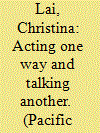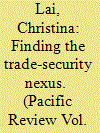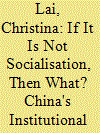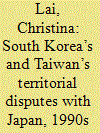|
|
|
Sort Order |
|
|
|
Items / Page
|
|
|
|
|
|
|
| Srl | Item |
| 1 |
ID:
157812


|
|
|
|
|
| Summary/Abstract |
Over the last two decades, China has experienced one of the most dramatic and sustained periods of economic growth in world history. China's use of economic statecraft provides an important venue in which to examine the role of unacknowledged ‘coercive diplomacy’ within the context of China's ‘peaceful rise discourse.’ In contrast to Western countries, which have overtly used sanctions and other forms of economic coercion, China has publicly denied any such policies while at the same time quietly pursuing them. China's denial of using coercive economic statecraft has muted the reactions of neighboring publics and government, but it cannot entirely forestall them. Without seriously undermining China's ‘peaceful-rising’ image, a more explicit statement from Beijing regarding its coercive economic measure could provide deterrence and assurance to China's neighbors in resolving the disputes. This article first surveys existing literature on economic statecraft focusing on the coercive aspects of such strategies. Second, it presents an in-depth case study on how China uses economic leverages over its neighbors in East Asia: North Korea, Japan, and the Philippines. Finally, it highlights the limits of China's economic statecraft within the constraints of China's ‘peaceful rise’ discourse. It concludes with implications for Asian politics and beyond.
|
|
|
|
|
|
|
|
|
|
|
|
|
|
|
|
| 2 |
ID:
172073


|
|
|
|
|
| Summary/Abstract |
Vietnam’s perceptions of China are complex and have been shaped bycultural affinity, the memory of wars, and geopolitical considerationsthroughout history. The construction of their foreign discourse has led tothe empirical puzzle: what makes China and Vietnam, two of the emergingpowers in East Asia, stick together in the post-Cold War era? How to explaintheir diplomatic spats in maritime disputes? This article traces the development of the ‘16 Word Guideline,’ adopted by both communist parties in 1999 and highlighted the binding effect of assurance rhetoric. This discursive context presents great opportunities for them for regional integration. A framework of ‘coercive rhetoric’ captures China’s and Vietnam’s official statements to signal benign intentions toward their neighbors, and to constrain foreign behavior from both sides.
|
|
|
|
|
|
|
|
|
|
|
|
|
|
|
|
| 3 |
ID:
167506


|
|
|
|
|
| Summary/Abstract |
Since Ma Ying-Jeou assumed presidency in 2008, he promoted an Economic Cooperation Framework Agreement (ECFA) and Taiwan’s political rapprochement with China. However, the opposition party soon proposed a counter argument, claiming this agreement might produce severe negative consequences for Taiwan’s economy and sovereignty.
This study presents a securitization framework to highlight both the KMT and DPP strategy in contesting the nature of ECFA despite the potential inflation of benefit. It investigates both the KMT and DPP securitization strategies under Taiwan’s political and economic contexts. A de-securitizing discourse, though might have been a convincing counterargument against ECFA, was underdeveloped by the DPP members. It also shows how the debate shapes the discourse in the Sunflower Student Movements in 2014, and led to the DPP’s subsequent change of securitization strategy.
|
|
|
|
|
|
|
|
|
|
|
|
|
|
|
|
| 4 |
ID:
192162


|
|
|
|
|
| Summary/Abstract |
Over the last few decades, China has become one of the most important foreign investment destinations and centers of economic development in Asia. China’s growing economic clout and coercive measures lead to the following empirical puzzles: how has Taiwan perceived China’s increasing military capabilities and economic influence? What are the major factors that facilitate or constrain the role of a government agency of a weaker state in addressing the economic power of a stronger one? More specifically, what has been the purpose of Taiwan’s economic statecraft? Based on Taiwan’s official statements, regional trade data, and newspaper coverage in Chinese and English, this study investigates both positive and negative evaluations of China-Taiwan trade from 2009 to 2021. From 2009 to 2016, President Ma Ying-jeou adopted a desecuritization strategy in normalizing bilateral trade with China, and he actively promoted greater liberalization of Taiwan’s financial and service sectors for China’s investment. From 2016 to 2021, President Tsai Ing-wen employed a securitization strategy in light of the risks of economic reliance on China’s markets. The article proceeds as follows. First, it engages the current literature on economic statecraft, China-Taiwan relations, and Asian politics. Second, this study offers a framework of desecuritization and securitization of Taiwan’s trade toward China, and it highlights how the political leaders in Taiwan attempt to find a balance between trade and security. Third, it provides in-depth case studies on how Taiwan executed desecuritization and securitization strategies. Finally, it concludes with some initial thoughts on the studies of comparative economic statecraft, and provides policy implications for countries in the Asia Pacific region and beyond.
|
|
|
|
|
|
|
|
|
|
|
|
|
|
|
|
| 5 |
ID:
187270


|
|
|
|
|
| Summary/Abstract |
The Asian Infrastructure Investment Bank (AIIB) was established in 2014 to fund infrastructure plans and enhance economic development in Asia. As a founding member, China's strong presence raises the question of whether Beijing is selectively using institutions to promote its interests, or if it genuinely sees itself as a responsible power in the international community. This also leads to an empirical puzzle: What are China's strategies in maintaining a new institution? How can Beijing assure others and gain more influence in global economic governance? This study challenges the views on China's hegemonic ambitions in creating the AIIB, and suggests that Beijing's experience of socialisation in international organisations has positively contributed to China's institutional strategy. The author engages the current "China threat" debates in the literature of international relations and highlights that China's maintenance of both its benign image and its institutional strategy remains an understudied area. The author proposes a normative perspective to highlight Beijing's strategy in responding to the "China threat" theory. China's rise indeed offers both challenges and opportunities to the current world order.
|
|
|
|
|
|
|
|
|
|
|
|
|
|
|
|
| 6 |
ID:
179947


|
|
|
|
|
| Summary/Abstract |
China’s capabilities and prestige in the Sui and Tang dynasties (581–907) were stronger than the Koguryo Kingdom, but Koguryo resisted China’s tributary system more than other countries during 598–668. This article unpacks the unique role of the tributary system within Chinese foreign policy toward Koguryo, and it shows how the symbolic concept of political prestige affected China’s decisions to go to war against Koguryo during the Sui and Tang dynasties. It highlights the role of status and legitimacy that the Chinese emperors attached to China’s tributary systems, and argues that these status concerns, rather than the material factors emphasized by offensive realism and defensive realism, drove Chinese behavior. China’s capabilities were rising compared to those of the Koguryo kingdom, so there were no incentives for preventive war, and political discourse among China’s political elites showed great concern over status. Their justifications of military expeditions and heated debates in the Chinese court provide strong evidence illustrating this consistent struggle to reclaim supremacy in Northeastern Asia. The finding of the study indicates that Asian history should not simply be treated as empirical data to test Western international relations (IR) theory; rather, Asian history can contribute to theory building in IR.
|
|
|
|
|
|
|
|
|
|
|
|
|
|
|
|
| 7 |
ID:
172712


|
|
|
|
|
| Summary/Abstract |
South Korea and Taiwan are former Japanese colonies that have undergone similar processes of state-building since WWII. But they have chosen different rhetorical frameworks in their maritime disputes with Japan. In South Korea, negotiating with Japan can be viewed as threatening the country’s independence and pride, whereas in the Taiwanese government, cooperation with Japan is considered mutually beneficial. Why have these two countries taken such divergent stances toward Japan?
This article examines the territorial disputes between South Korea and Japan over Dokdo, and between Taiwan and Japan over the Senkaku Islands. It sets forth a rhetorical framework of comparison, and it proposes a constructivist perspective in understanding South Korea’s and Taiwan’s legitimation strategies toward Japan from the late 1990s to 2018. This comparative study suggests that the differences between their legitimation strategies can be traced to their different colonial experiences with Japan.
|
|
|
|
|
|
|
|
|
|
|
|
|
|
|
|
|
|
|
|
|